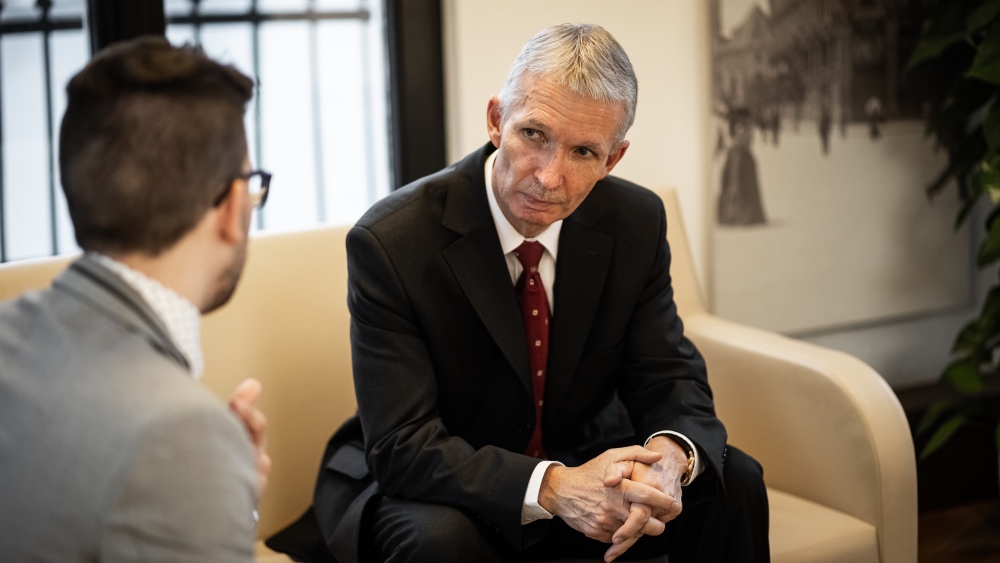We remain loyal to our Hungarian friends - German liberal politician Gerhard Papke told Mandiner.
"Germans love and support Hungary, but you won't hear about it in the German media." As a German liberal, Gerhard Papke stands out for Hungary, who was asked by Mandiner about his party's left-wing alliance, Merkel's legacy, topics dominating the German public and Hungary's opinion!
Gerhard Papke, the former vice-president of the North Rhine-Westphalia state parliament, the former faction leader of the Free Democratic Party (FDP), and the current president of the German-Hungarian Society of the Federal Republic of Germany, received the Knight's Cross of the Hungarian Order of Merit the other day.
The paper talked to him about the future of German liberals, the woke revolution in Germany, migration and the German perception of Viktor Orbán.
I am not satisfied with the coalition agreement that has just been published. To be honest, I'm on the right side of the German Free Democratic Party. It's a shame that in recent years my former young friend, Christian Lindner, the party's president, has pushed the party more or less to the left. Obviously, this was the prerequisite for this left-wing coalition that is now being formed.
When you are in government, you have to deal with reality. And based on my own experience, I am convinced that many things will change. They agreed to transform the European Union from a coalition of free and sovereign member states into a kind of federal state. And this obviously cannot be done without the consent of all the members of the European Union. And there are a lot of them, including them
Hungary, Poland and others who would never give up their sovereignty to a more or less centralized state or allow themselves to be controlled by Brussels.
What kind of legacy did Merkel leave? He stood for the policy of open borders, as a result of which 2.5 million people have arrived in Germany since 2015, causing huge problems in our country. However, the protection of the family was lacking. Merkel's principle was destruction. For whatever reason you did it, at the end of the day there is nothing left. And this is the situation in Germany at the moment.
I am the president of the German-Hungarian Society. Obviously, I am a great admirer of Hungary. I love this country. It's a great country with great people. Hungarians love freedom. Many Germans will never forget the 1956 revolution, which was so important not only for Hungary, but also for Europe, because at that time they realized that oppression does not last forever. The Hungarian people showed us that it is possible to win the fight against communism. What you can read in many German newspapers and see on German television these days is not really the position of the German people.
Germans love and support Hungary, but you won't hear about it in the German media.
And I will give you an example: during the European Championship, the leftists in Germany tried to accuse Hungary in a crazy and unbelievable way, and I spoke out against it. I am very active on Twitter and published a pro-Hungarian tweet that was read by 2.5 million people in Germany. 2.5 million! And my position was also discussed on German television, in an important TV program. I said that the Hungarians are our friends. We must remain loyal to our friends. Thus, in the following days, I received hundreds of e-mails and hundreds of letters from Germans who said they agreed with my pro-Hungarian position. And this motivates me, as a German politician, to stand before the public and say: let's see what Hungary is doing. What Hungary is doing is important for us in Germany and for Europe as well.
I am not the only one in Germany who is convinced that Hungary's policy implemented over the past 11 years is the right direction for Europe as a whole.
I am convinced that what we will see in the coming years is a fundamental debate about the future direction of the European Union, whether we want a Europe based on the sovereignty of independent, free nations, whether we want the Euro, whether we want a Europe that is for families is being built, do we want a Europe where men and women have equal rights - or do we want to live like in Islamic countries? And on these topics, Hungary has a decisive and very important role in the European debate. Many of my Twitter followers and others who have emailed me say,
more Orbans are needed in Europe.
If Europe does not accept the Hungarian and, to a certain extent, the Polish way, then it will fail and there will be nothing left but the Islamic way. But there are many Germans who do not want to take the latter route.
Source and image: mandiner.hu













